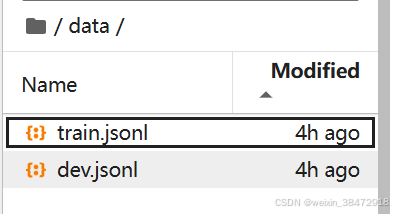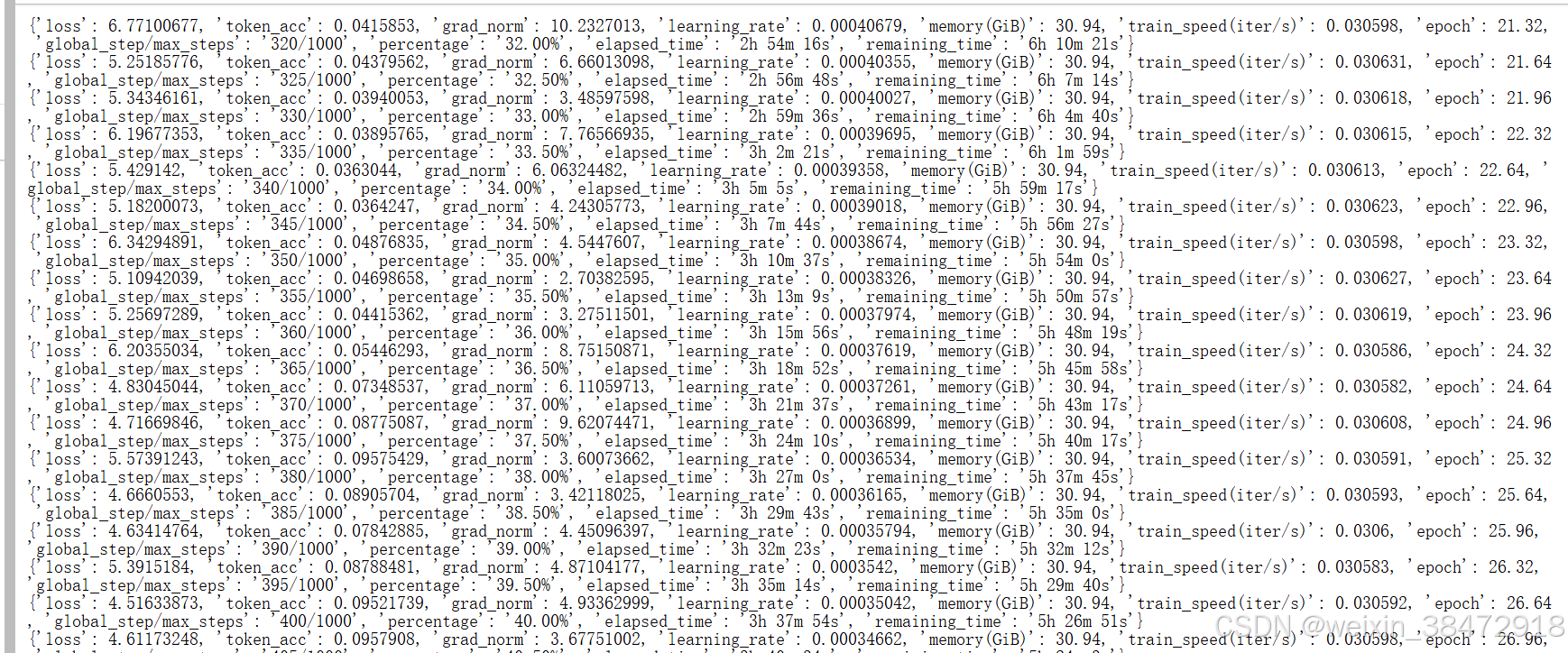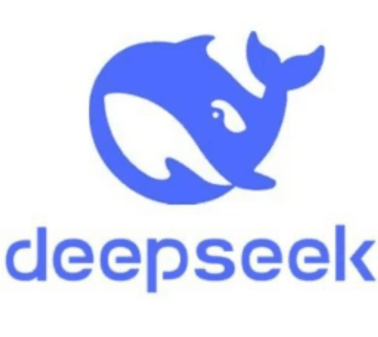ms-swift:一机多卡微调GLM-4-9b-chat模型操作
ms-swift是魔搭社区提供的大模型与多模态大模型微调部署框架,现已支持450+大模型与150+多模态大模型的训练(预训练、微调、人类对齐)、推理、评测、量化与部署。
简介:
ms-swift是魔搭社区提供的大模型与多模态大模型微调部署框架,现已支持450+大模型与150+多模态大模型的训练(预训练、微调、人类对齐)、推理、评测、量化与部署。其中大模型包括:Qwen2.5、InternLM3、GLM4、Llama3.3、Mistral、DeepSeek-R1、Yi1.5、TeleChat2、Baichuan2、Gemma2等模型,多模态大模型包括:Qwen2.5-VL、Qwen2-Audio、Llama3.2-Vision、Llava、InternVL2.5、MiniCPM-V-2.6、GLM4v、Xcomposer2.5、Yi-VL、DeepSeek-VL2、Phi3.5-Vision、GOT-OCR2等模型。
有兴趣的朋友可以去了解一下:
ms-swift官方地址
操作步骤:
准备一个一机多卡的服务,大家自己准备哈,也可以去购买云服务。
我准备的是2个32G显存的,内存是160G
#新建虚拟环境
python3 -m venv myenv(虚拟环境名称)
#进入虚拟环境
source myenv/bin/activate
1、安装ms-swift
从源代码安装:
# pip install git+https://github.com/modelscope/ms-swift.git
git clone https://github.com/modelscope/ms-swift.git
cd ms-swift
pip install -e .
也可以使用pip进行安装:
pip install ms-swift -U
2、下载模型
pip install modelscope
modelscope download --model ZhipuAI/glm-4-9b-chat
3、将模型复制到合适的位置
cp -r /root/.cache/modelscope/hub/models/ZhipuAI/glm-4-9b-chat ./
4、添加数据集
新建存放数据集的目录
mkdir data
然后上传数据集,一般有两个jsonl文件,一个是需要训练的数据集train.jsonl,另外一个是需要验证数据集的dev.jsonl,如下图所示
数据集的格式是这样的:
下面是一条数据集的格式,是一条json
{
"messages": [{
"role": "system",
"content": "你是一名软件测试工程师。你的任务是根据需求内容生成测试用例。"
}, {
"role": "user",
"content": "你需要用完整的需求内容来理解业务关联和逻辑,然后结合你对业务的理解针对指定的需求内容生成需要的测试用例,需要考虑测试用例覆盖度"
}, {
"role": "assistant",
"content": "好的,我将生成符合要求的测试用例,同时严格按照python list包含dict的格式生成"
}, {
"role": "user",
"content": "请为需求中的输入框最大输入长度限制35个汉字,汉字不做一个汉字等于两个字符的拆分。编写测试用例"
}, {
"role": "assistant",
"content": "[{'case': '验证输入框对HTML注入攻击的防护能力。', 'precondition': '1、学员已登录系统。\\n2、学习计划页面已打开。\\n3、入框可用。', 'operation_steps': \"1、在输入框中输入含有HTML标签的文本,例如 <script>alert('XSS');</script>。\\n2、点击“确定”按钮。\\n3、观察页面提示信息。\", 'expected_results': '输入框应过滤或转义HTML标签,不执行任何HTML或JavaScript代码。\\n提交后,页面不应显示弹窗或其他由注入代码引起的副作用。'}]"
}]
}
如果有多条json这样的:
5、配置ms-swift微调命令
新建一个lora_run.sh,内容如下:
# Use `--template default`
nproc_per_node=2
CUDA_VISIBLE_DEVICES=0,1 \
MASTER_PORT=29501 \
NPROC_PER_NODE=$nproc_per_node \
swift sft \
--model /root/glm-4-9b-chat \
--train_type lora \
--dataset '/root/data/train.jsonl' \
'/root/data/dev.jsonl' \
--torch_dtype bfloat16 \
--template default \
--num_train_epochs 10 \
--per_device_train_batch_size 1 \
--per_device_eval_batch_size 4 \
--learning_rate 5e-4 \
--target_modules all-linear \
--gradient_accumulation_steps $(expr 16 / $nproc_per_node) \
--eval_steps 500 \
--max_steps 1000 \
--save_steps 500 \
--logging_steps 5 \
--output_dir output \
--system 'You are a helpful assistant.' \
--warmup_ratio 0.05 \
--dataloader_num_workers 4 \
--max_new_tokens 3000 \
--ddp_find_unused_parameters False \
CUDA_VISIBLE_DEVICES:控制使用哪些GPU,默认使用所有卡,类似数值id,如果有4个GPU,可以设置为:1,2,3,4。
MASTER_PORT:torchrun中–master_port的参数透传。默认为29500,其实就是端口号
NPROC_PER_NODE:就是所使用的线程数,用几个显卡就几个线程数。
–model:模型id或模型本地路径
–train_type: 可选为: ‘lora’、‘full’、‘longlora’、‘adalora’、‘llamapro’、‘adapter’、‘vera’、‘boft’、‘fourierft’、‘reft’。默认为’lora’
–dataset:数据集路径
- output_dir: 用于保存模型和其他输出的目录。
- max_steps: 训练的最大步数。
- per_device_train_batch_size: 每个设备(如 GPU)的训练批次大小。
- dataloader_num_workers: 加载数据时使用的工作线程数量。
- remove_unused_columns: 是否移除数据中未使用的列。
- save_strategy: 模型保存策略(例如,每隔多少步保存一次)。
- save_steps: 每隔多少步保存一次模型。
- log_level: 日志级别(如 info)。
- logging_strategy: 日志记录策略。
- logging_steps: 每隔多少步记录一次日志。
- per_device_eval_batch_size: 每个设备的评估批次大小。
- evaluation_strategy: 评估策略(例如,每隔多少步进行一次评估)。
- eval_steps: 每隔多少步进行一次评估。
- predict_with_generate: 是否使用生成模式进行预测。
- generation_config 部分
- max_new_tokens: 生成的最大新 token 数量。
这里就不过多解释,具体的命令可以去官方文档上查看:[ms-swift官方文档命令说明]
6、执行lora_run.sh
记得给此Shell脚本执行的权限:
chmod 755 lora_run.sh
#执行该脚本
./lora_run.sh
下面正在训练的模型:
7、合并模型
# Since `output/vx-xxx/checkpoint-xxx` is trained by swift and contains an `args.json` file,
# there is no need to explicitly set `--model`, `--system`, etc., as they will be automatically read.
swift export \
--adapters /root/output/v0-20250302-112152/checkpoint-1000 \
--merge_lora true
8、推理模型
使用训练后的模型推理:
# Since `swift/test_lora` is trained by swift and contains an `args.json` file,
# there is no need to explicitly set `--model`, `--system`, etc., as they will be automatically read.
# To disable this behavior, please set `--load_args false`.
CUDA_VISIBLE_DEVICES=0 \
swift infer \
--adapters /root/output/v0-20250302-112152/checkpoint-1000 \
--stream true \
--temperature 0 \
--max_new_tokens 2048
执行此脚本后,输入问题即可
使用合并的模型进行推理:
CUDA_VISIBLE_DEVICES=0 \
swift infer \
--model /root/output/v0-20250302-112152/checkpoint-1000-merged \
--infer_backend pt \
--temperature 0 \
--max_new_tokens 2048
9、遇到的问题
1)当使用lora训练,并使用torchrun启动时,会出现如下报错:
RuntimeError: Expected to mark a variable ready only once. This error is caused by one of the following reasons: 1) Use of a module parameter outside the `forward` function. Please make sure model parameters are not shared across multiple concurrent forward-backward passes. or try to use _set_static_graph() as a workaround if this module graph does not change during training loop.2) Reused parameters in multiple reentrant backward passes. For example, if you use multiple `checkpoint` functions to wrap the same part of your model, it would result in the same set of parameters been used by different reentrant backward passes multiple times, and hence marking a variable ready multiple times. DDP does not support such use cases in default. You can try to use _set_static_graph() as a workaround if your module graph does not change over iterations.
解决办法:
所以最后添加了此参数:
–ddp_find_unused_parameters False
2)在对训练后模型进行推理时,发现回答问题不全
如下图所示:
猜测应该是训练时读取数据集的数据不全导致
解决办法:
所以在lora_run.sh脚本中添加了–max_length 2048 \,参数配置
3)进行推理时,报错
AttributeError: ‘ChatGLMForConditionalGeneration’ object has no attribute ‘_extract_past_from_model_output’
解决办法:
在使用transformers4.49.0版本时都会遇到此问题,只能降版本到transformers4.48.3
更多推荐
 已为社区贡献1条内容
已为社区贡献1条内容









所有评论(0)